The fact is, remote work is rising in popularity across the world. It’s not a short-term trend, it’s here to stay.
Since 2005, the number of people who work from home has increased by 140%. It’s estimated that, by 2028, 73% of all departments will have remote workers.
When it comes to fully remote companies, you only need to skim the top 100 remote businesses to recognize some of the top tech and SaaS brands. Companies like Invision, Basecamp, Baremetrics, and Github all thrive with remote teams.
Even if a company isn’t fully remote, they might have a flexible work policy. In a recent survey on productivity, only 30% of companies had only a local in-office team.
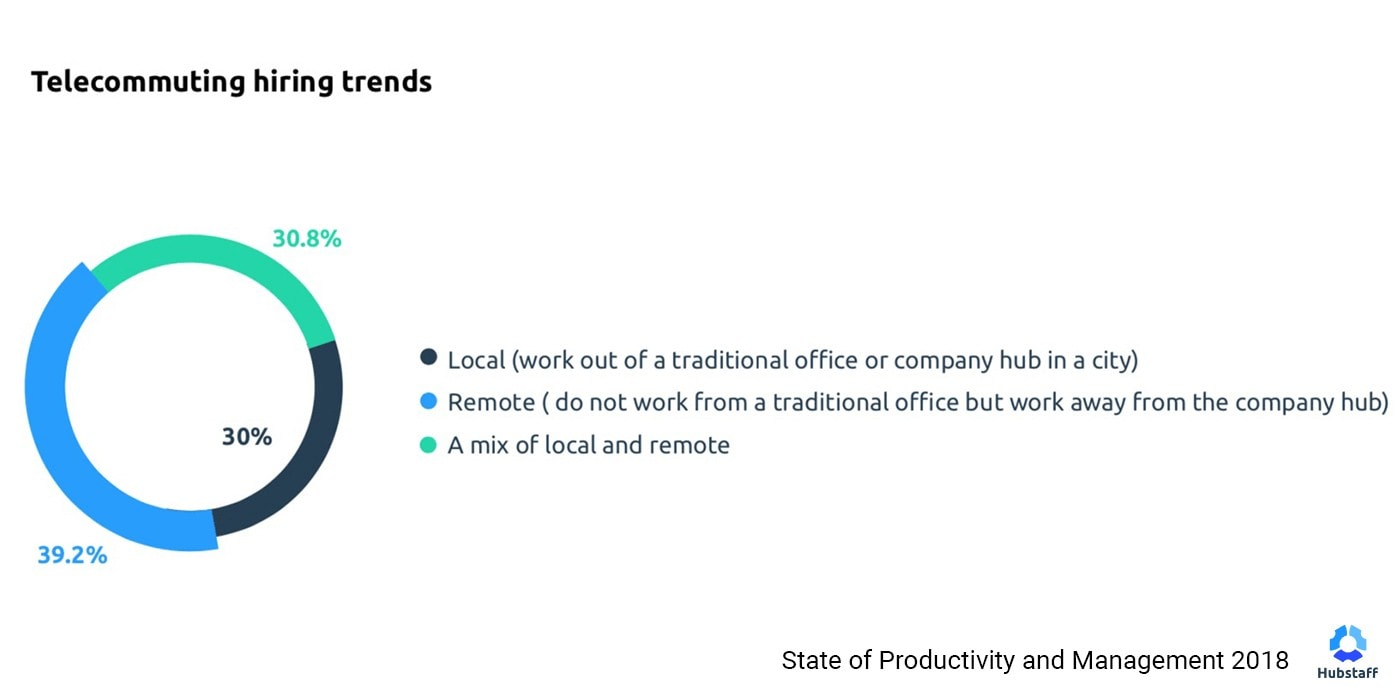
And then there’s the situation we’re in now: a global pandemic that’s causing businesses to close offices to protect their employees’ health.
Remote work is a big deal, and that’s why I want to show you why your company should embrace it — either on a large or small scale.
I get that you may have questions and reservations about this, but remote work should be embraced, not shunned. If done right, having a remote workforce will end up being a huge benefit for your company.

There are numerous articles on the internet about “how to work remotely” or “how to stay productive while working from home.” While these articles touch on what remote work is, many of them don’t touch on the most crucial part — why you should work remotely at all.
What follows is my most convincing argument for why you should let your people work remotely. I’ll cover my personal experience with running remote-based companies for the past 16 years and how we grew Hubstaff to a team of 55 across 17 countries.
Boost your team’s efficiency with Hubstaff's productivity tools
Try it free for 14 daysBefore we get started
When someone is asking to work from home — full-time or part-time — a manager’s first thought might be negative. This is not something to be afraid of.
The reality is that the world is full of different kinds of workers. Some people would prefer to work from home while others prefer working in an office. This preference doesn’t have anything to do with how well the person is going to perform at their job.
Your company, your department, and your people have work that needs to get done. I’m here to tell you that it doesn’t matter where that work gets done so long as it gets done at all.
There are people all over the world that would be very happy to do the work that needs to be done, and in many cases, they can do that work better than the people in your local area.
At Hubstaff, we’ve experienced tremendous growth since 2013, all by accessing a global talent pool. Hubstaff was most recently #842 on the Inc. 5000, and several companies that are entirely remote are outperforming us. Clearly, we’re onto something.
Disadvantages of remote work
As with anything in life, remote work is a balance. It’s not all positive.
I want to get the negative points out of the way first so we can get to the good stuff. My hope is that you’ll see that the pros far outweigh these potential downsides.
Con 1: Communication can be harder on a remote team
In many cases, it’s harder to manage a team that’s all over the world versus one that’s in an office.
This isn’t always the case, but it can sometimes be harder to define what needs to be done, understand what everyone is doing currently, and get feedback on everything that’s in motion.
This really comes down to communication style, though.
If you can find more efficient ways to communicate your team’s needs and expectations, then you’ll be able to avoid these problems.
Thankfully, there are many tools like Zoom and Slack that make communication with a remote team much more accessible, but they do come with one drawback.
Con 2: Deep connections are harder to form in a remote team
The reality is, if you want to grab a beer or lunch with a remote co-worker, you’d need to hop on a plane and fly 3,000 miles to see them in person.
Remote work doesn’t naturally foster close connections with co-workers and, therefore, makes work relationships more about the “work” than they are about the personal connection.
But, personal connection matters for any company, and with remote work, it’s just harder to form those deep connections. This just means you have to put in a little more effort.
This is the exact reason why we plan an annual retreat for our team. Once a year, we spend an entire week working and hanging out together in a different location somewhere around the world. Most of this time is spent talking, playing poker, having beers, and getting to know each other outside of our regular work life. Oh, and we spend some time working as well.
Here’s the deal, remote work has no more cons than on-site work does. Yes, there are a few disadvantages, but in my opinion, the pros outweigh the cons.
The benefits of remote work
After 16 years of running a remote company, I can confidently say that I would never go back to working in an office. Well, other than the one that’s in my house, of course.
So, what are the pros of remote work? These are the advantages I’ve found, ranked in order of importance for my business and my team.
Pro 1: Working remotely has a positive impact on personal happiness (regardless of role in the company)
I truly value my time, and I think when it really comes down to it, most of the working population is the same.
People call this having more flexibility or freedom, but really, it’s just about having more time to do what you want. Personally, I value this over anything else.
Remote work isn’t just flexible — it provides you with the time and freedom to work where you are, as you are.
It allows me to get my kids off the bus when they’re home from school, go on a run when I want to, or mow the lawn at 2:00 in the afternoon. I can make breakfast for my family, help my wife clean the house, and get things done on a timeline that actually works for me.
Because time is what I value most, and remote work provides me with more time, remote work plays a significant role in my overall happiness.
I realize not everyone has the same values.
Still, I do believe that when people ask to work remotely, they are the ones who value time and flexibility.
It has nothing to do with how motivated they are, their level of commitment to the company, or their character, skills, or attention to detail. They simply value flexibility and making their time their own.
When people feel that their values are not aligning with their work and how they wish to be living their lives, they become unhappy and bitter. But, if the values and lifestyle line up, workers are generally much happier.
I am incredibly proud of Hubstaff’s retention rate, and I believe that has a lot to do with the sense of peace our employees feel with their work situation.
We’ve given them a chance to have their values line up with their work lives, and clearly, it’s working out:



Nothing makes me more proud than being able to see the people at Hubstaff living the lives they want to live.
Pro 2: A better pool of talent
One of Hubstaff’s main advantages is that we are not burdened by geography. If we needed to hire a marketing manager or designer, we don’t have to limit our search to the Indianapolis area. We can look anywhere in the U.S., Canada, or worldwide.
We get hundreds of applications each quarter purely because we offer remote work, pay well, and allow anyone to apply regardless of location. We often get parents who want to both spend time with their kids and have a meaningful career.
Remote provides the perfect opportunity for that person to find a rewarding, well-paying position without sacrificing their lifestyle or values. They can have the best of both worlds.
Another benefit: the quality of the people applying is higher than in our local area.
At Hubstaff, we hire a lot of specialists. If we are looking for someone to lead our advertising efforts, we are not going to hire a generalist. We will look for someone with the deepest advertising background possible.
Remote hiring allows us to find the perfect people for the job. Maybe they have worked at some of the best agencies in the world while in New York, but then decided to move to Idaho to be closer to family.
While they might have a harder time finding work there, remote work makes it possible for us to find top talent and for them to find fulfilling work.
Pro 3: Fewer distractions
Most people think that working from home causes distractions, but I think it’s the opposite.
When I am at home, I have my own space. I can lock the door when I have meetings and go into deep focus mode when I need to. I can set up my environment for my success.
But, in an office, you can quickly be pulled in a million directions and easily find yourself chatting with those around you. Most days, there would be a lot of people stopping by my desk, and in every one of those cases, it would be to work on their agenda and not mine.
My home office is set up so that I can come and go as I need to without increasing distractions.
Pro 4: Better use of time
Commutes suck.
They are 100% wasted time, and the worst part is that employees start to resent the company for it. They know that they can get the same work done from home, but the company is forcing them to come into the office.
Companies that allow remote work actually get the opposite effect. They gain goodwill because they understand this.
Employees can invest the gained time however they want.
The average person in the U.S. commutes 52.5 minutes per day. That adds up to 4.35 hours a week and over 200 hours per year.

Imagine what you could do with all that extra time extra each day. You could exercise, make the kid’s lunches, or more commonly, invest it back into your business.
I would argue that this could be the single most significant benefit that you can provide to your people. More than money, more than vacation time, more than anything else.
Your company has an opportunity to truly improve the daily lives of the people that work for you by freeing them from time-wasting commutes.
Pro 5: Your people can be more financially stable
Because they are not commuting, they are not spending money on gas, (or drive-through coffees or extra car repairs due to use).
The typical person in the U.S. works 16 miles from home, and at the time of this writing, the average gas prices are $2.55 per gallon. That’s over $2000 per year in gas.

Plus, if they’re working at home, they don’t have to pay to go out to lunch every day. If you consider an average savings of $5 per day and there are 250 working days per year, that’s another $1,250 annually.
Imagine what you could do with that money. You could start a college, travel, or house fund for your family, take your spouse out for a nice dinner, or invest it in future business ideas.
The possibilities are endless.
Pro 6: Company savings
With remote work, you have a few options.
You can choose to offer remote as a choice if you already have a brick-and-mortar office.
Maybe it’s an entirely remote position or one that they only have to come in for a few times a week or month. In this case, because you still have a physical office, you will still need to pay rent for an office, along with utilities and office supplies.
The second option is to go fully remote, where your team is 100% distributed. This opens you to hire talent from anywhere in the world, and you don’t need to have an office.
No office means no rent. When we were starting Hubstaff, we were bootstrapped and we didn’t have a ton of budget. I think that is a common case these days. It’s no longer a requirement to spend your starting capital on rent.
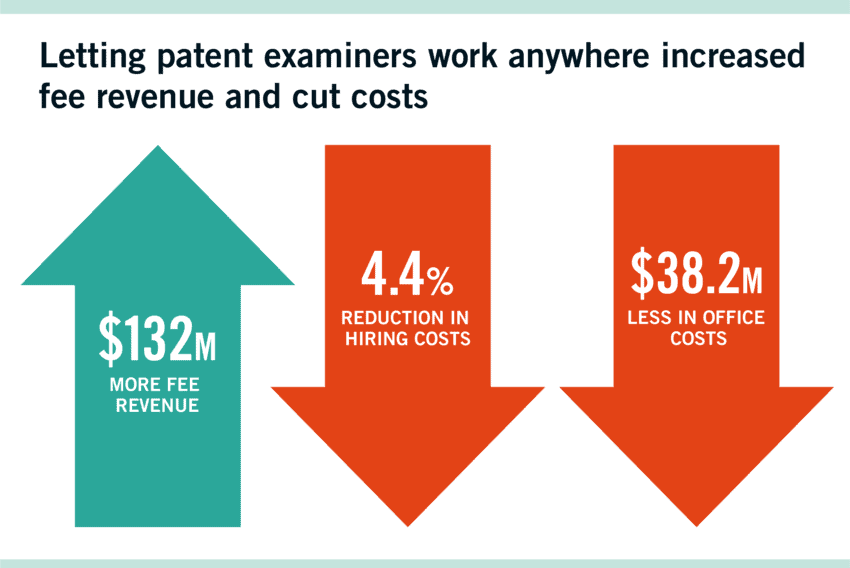
Additionally, if you were to choose to hire talent from another area, you could save on labor costs. Professionals living in a city with a high cost of living need higher wages. Those who live in smaller cities or in outlying areas are just as talented, but without the costly daily expenses.
Pro 7: Retention
Once people get a taste of working remotely, they rarely ever go back to an office.
In a 2019 survey, 99% of remote workers said they would like to work remotely at least some of the time for the rest of their careers.
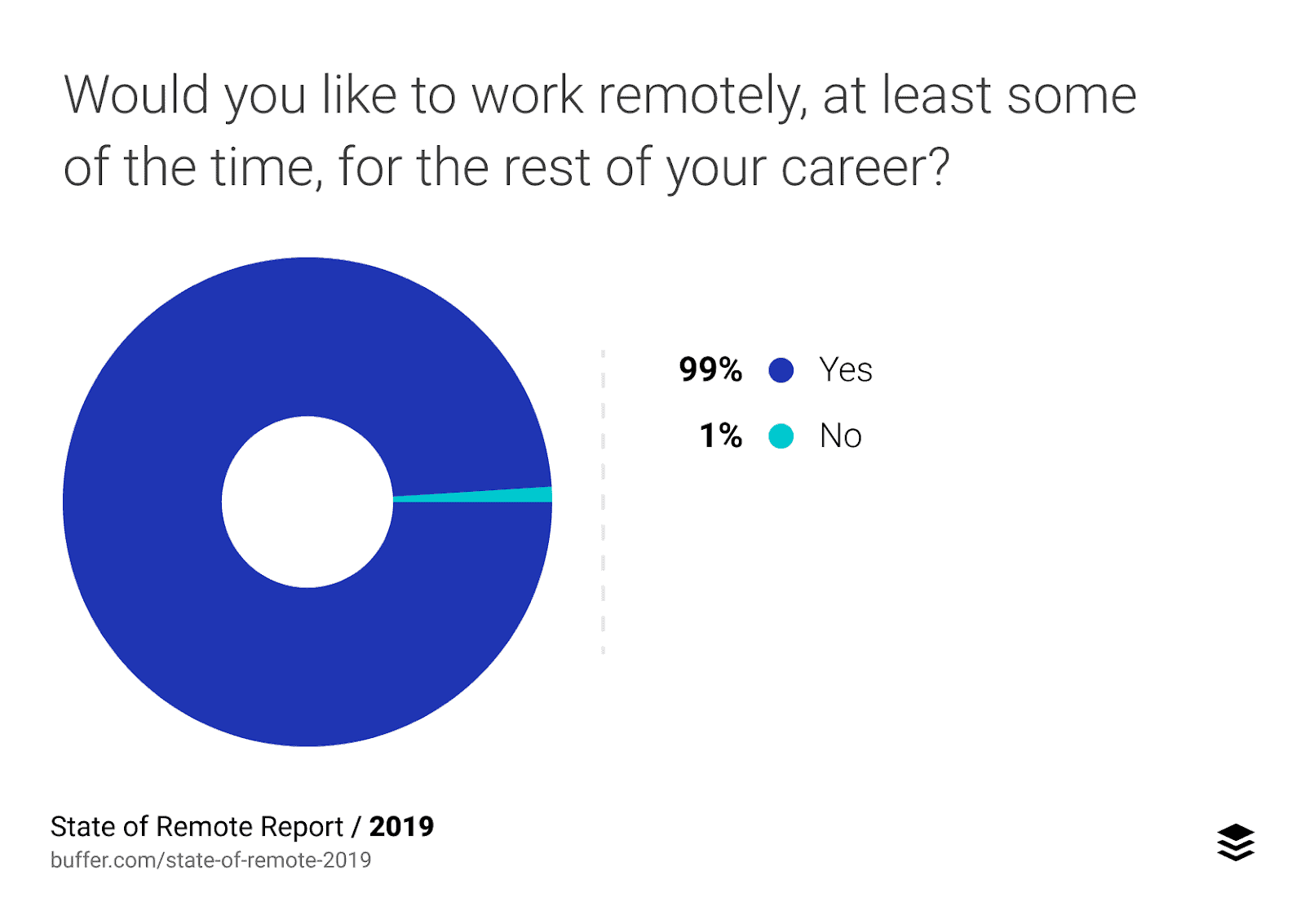
Experts are even predicting that with the recent COVID-19 pandemic, numerous companies that transitioned to remote work may choose to keep it that way even after restrictions are lifted.
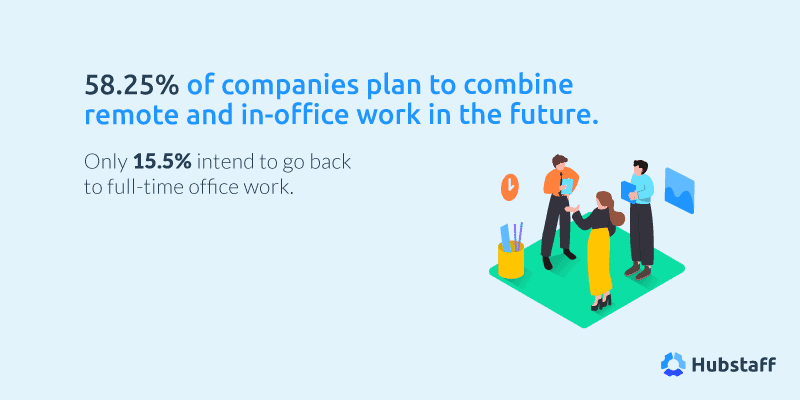
If your company is offering remote work, it’s going to be hard to find a better option. The benefits greatly outweigh the disadvantages. Once you get a taste for remote life, it’s hard to give it up.
Your people will love the flexibility of working from home. If they have to take their child to an appointment, they can easily log on earlier or stay a little later that day — it’s not a big deal. If they are in the office, they just don’t have the same options.
And that flexibility and general increase in happiness will give them more reasons to stick with a remote job.
In fact, 56% of businesses surveyed cited flexibility as a factor in retention.
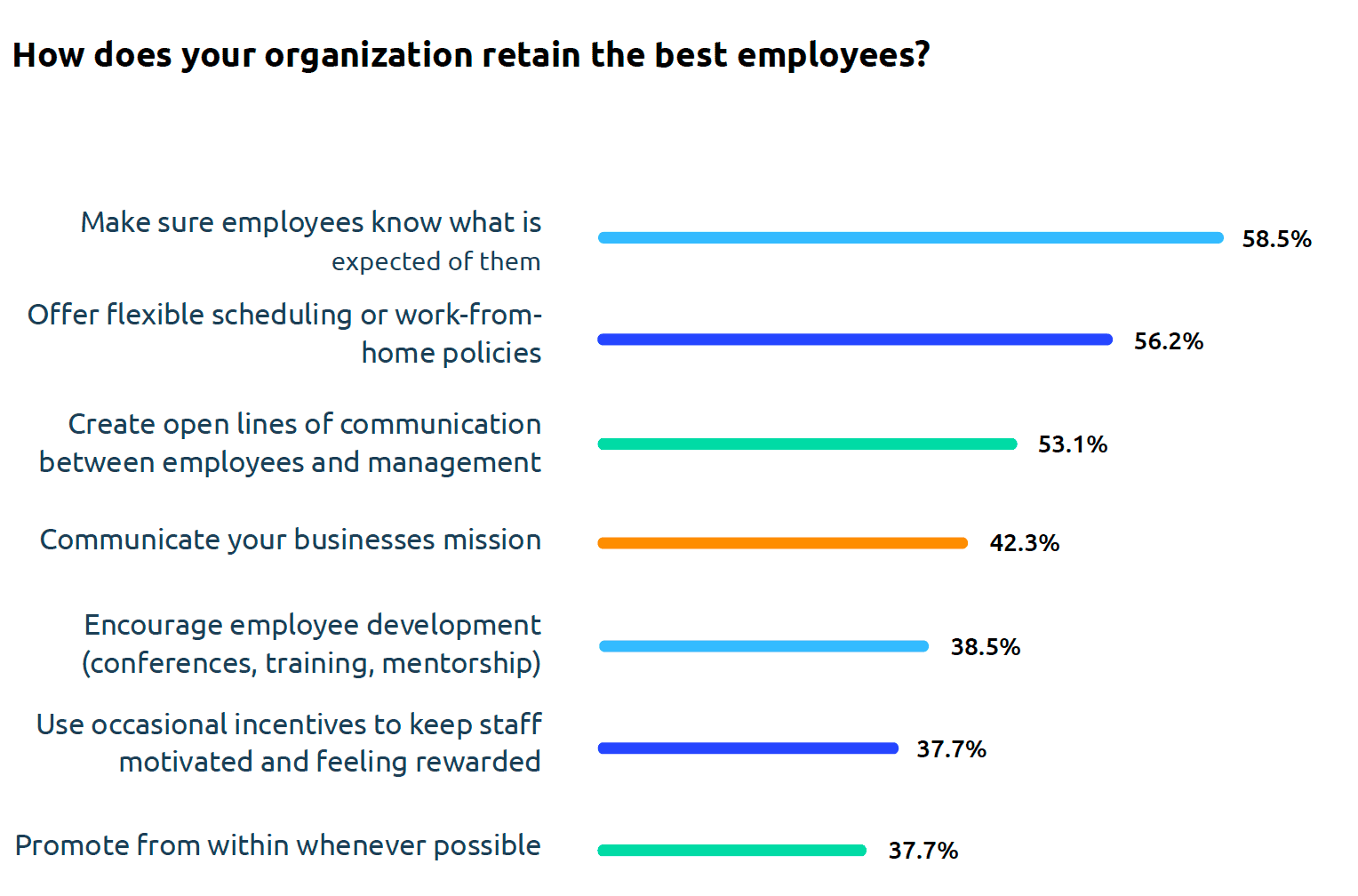
Pro 8: Technology now exists to enable remote work
10 years ago, remote work was a lot harder than it is today. It wasn’t impossible, but meetings required phone lines and a significant amount of email.
Today we have Zoom and Google Drive. Need to ask someone a quick question? Send them a note over Slack. And, now that high-speed internet is available in more homes, it’s easier than ever to stay connected.
Plus, with options like PayPal and Transferwise, you can now pay your team from anywhere and for the best possible exchange rate.
As the years go on, this will only get easier. With the rise of streaming and online viewership, more and more tech is being developed that makes it easier to stay connected to people on a global scale.
Pro 9: Freedom
Remote work makes it possible for people to work in their own ways.
For some, this would look like working from a coffee shop with headphones in, while others prefer absolute quiet in their basement.
Some people will want to be close to their parents and family, and some would want to move to a big city.
Some may want to move to a new country.
The point is, having the freedom to work as you please is a vast advantage that can lead to better results, productive teams, and more creative ideas.
Pro 10: Better for their health
When people think of remote work, they often don’t think of health.
But, it does play a significant part in the equation.
We have several team members at Hubstaff with vegetarian, vegan and gluten-free diets. Being more in control of your surroundings makes it easier to maintain these lifestyles.
Hubstaffers are also fairly active. We have rock climbers, yogis, soccer players, runners, cyclists, skiers, and weightlifters.
Giving these people the option to work out when they want to is a massive advantage for them. If they were in a traditional office, they’d have to choose between getting up early in the morning or going after work, which eats into some of the most critical hours of the day.
Plus, from a physiological standpoint, if you’re beginning to feel burnt out or overwhelmed, you can take a step back, go for a walk, and get back to work when you’re ready. There’s no pressure to “perform” and your hours are yours, not someone else’s.
Pro 11: It’s better for the environment
I’ve talked a lot about cars here, but this is another big pro for remote work.
The environment is precious, and we are responsible for taking care of the world around us. That’s true if you work in an office or from home.
But, there’s something to be said about those who work from home and their impact on the environment.
If you drive to work every day, you’re burning a lot of gas. Your car will emit 20 pounds of CO2 per gallon of gas burned. If you were to add all that up, that’s an average of 5 ½ tons per year per vehicle.
If your company has 56 people in it, that’s 308 tons of CO2 that you’re pumping into the atmosphere. But, if you worked from home, those numbers change a bit.
By working remotely, you and your team can shrink your carbon emissions by more than 2.2 tons annually.
Need I say more?
Why you shouldn’t wait to go remote
As you can see, the benefits of remote work far outweigh the potential downsides.
Now the only question is: Why not give it a try?
When you’re ready to get started, check out this ebook with over 100 pages on best practices for remote team management.
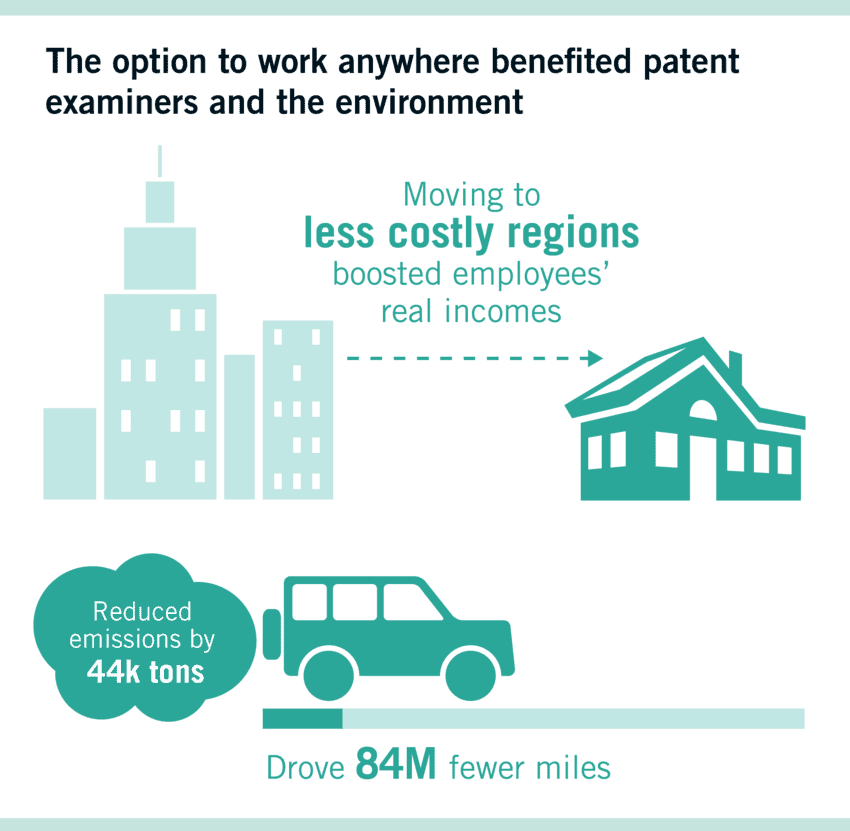
The remote work revolution
More and more companies are choosing remote work over the traditional office setting we’ve been accustomed to for so long. And, as I’ve already laid out, the benefits are apparent.
Your team can be happier, healthier, and more financially stable.
Your business can be more profitable and better equipped.
So how do you get started with a remote business? Well, there are a few ways. Firstly, you’ll need some of the tools like Slack and Zoom that we talked about before. Additionally, having time tracking software like Hubstaff can make it easier to keep tabs on your staff without having to check-in with them every day.
Next, it’s best just to go for it. Tell your staff to work from home every Friday and see what happens. Each Friday, ask yourself these questions:
- What’s working?
- What is falling behind?
- What are the blind spots that need fixing?
- How does the staff feel about this situation?
Be sure to ask for everyone’s feedback and, if things go well, maybe start having the teamwork from home more often. From here, it’s entirely up to you.
This is the unsung benefit to remote work. You can make it want what you want. It’s not going to look the same for everyone, and making it work for your team is the key to your success.
So, what are you waiting for? Let’s get started with this remote work revolution.
Subscribe to the Hubstaff blog for more posts like this
Most popular
How to Calculate a Raise: Practical Guide for Employers
By 2030, the US alone will lose $430 billion annually due to low talent retention — and a lot of this turnover stems from low pa...
How to Survive and Thrive in an 80-Hour Work Week
It’s hard to believe that only a century ago, the 80-hour work week was the norm in the United States. Then, in 1926, the Ford M...
Mastering Workforce Scheduling: Techniques and Tools for Success
Imagine a workday where scheduling your workforce effectively ensures that every shift is perfectly aligned with your business nee...
Top Time Trackers for Virtual Assistants: Enhance Efficiency and Accountability
Virtual assistants (VAs) have a lot of responsibilities — and so do the people who hire them. With so much to keep track of, a t...





